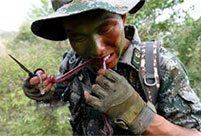

BEIJING, July 17 -- Reports on alleged Chinese ban on the Muslim holy month of Ramadan and related religious activities by some Turkey news media recently are groundless and irresponsible, and run contrary to the irrefutable facts of general ethnic harmony in China.
In violation of fundamental principles universally observable by all news media, some Turkish news media, driven by ulterior motives, made quite irresponsible and baseless reports on so-called interference by Chinese authorities in Ramadan and other religious activities in China, resulting in violence against the Chinese embassy and tourists in Turkey.
In serious cases of violence, businesses with Chinese interests were looted, and even some Korean people in Turkey were attacked as they were mistaken as the Chinese nationals.
However, a tour around China during the holy month revealed the real life among the vast number of Chinese Muslims and showed how far the irresponsible and hate-driven Turkey news media had gone in making those fabricated and distorted reports.
In northwest China's Xinjiang Uigur Autonomous Region, where more than 10 million Muslims live, the Ramadan is widely observed by ethnic minorities including Hui, Uigur, Kazakh, Uzbek, Tajik and Kyrgyz peoples.
The holy month, from June 18 to July 18 this year, is a season of fasting and spiritual reflection as Muslims are not allowed to eat or drink from sunrise to dusk.
Abdurahman, Imam of a mosque in the regional capital city of Urumqi, said the mosque usually receives 1,200 visitors daily, but during Ramadan the number has risen to over 3,000.
"The government has given us enough protection and respect," he said, adding that the local government carried out fire and epidemic prevention work ahead of Ramadan.
Muslims from outside China are also feeling the peace of Ramadan in Xinjiang. At the International Grand Bazaar in Urumqi, a dozen Turkish businessmen are selling specialties such as food, clothing, accessories and carpets.
Cihan Aydogmus, 38, has lived in Xinjiang for more than 10 years. He owns two carpet factories, one in Istanbul and the other in Kashgar. He is married to a Uigur woman and has two children.
"My wife is fasting, but I am not since I have been too busy with my business. People here decide by themselves whether to fast and whether to go to the mosque based on their own situations, without interference from others," he said.
"It is untrue that Ramadan in Xinjiang has restrictions. What I see here is a free and easy atmosphere," he said.
In China, religious belief is ensured by the Constitution, which stipulates any government organs, social groups or individuals are not allowed to force anyone to convert to or abandon a religious belief.
A special meeting was convened by the government in Xinjiang ahead of the holy month with a focus on measures to ensure lawful religious activities by local residents.
The government of the autonomous region made it clear before Ramadan that authorities should fully understand, respect and show consideration toward Islam, said Ma Pinyan, a researcher with the Xinjiang Academy of Social Sciences.
"Many shops around the mosques have been providing those who fast in the day with free fruits, desserts and meal," said Eli Hupur, another researcher with the academy who studies ethnic culture.
"The streets were busy even at midnight. On the brightly lit streets, we saw people on their way to visit their families and vendors selling fruits," he said.
 PLA soldiers eat raw snake meat in harsh training
PLA soldiers eat raw snake meat in harsh training Doctors use 3D-printed skull to save girl
Doctors use 3D-printed skull to save girl Yunnan-Myanmar Road: The past and present
Yunnan-Myanmar Road: The past and present Campus belle of Xiamen University gets popular online
Campus belle of Xiamen University gets popular online Who says moms cannot be trendy and hot?
Who says moms cannot be trendy and hot? 10 Chinese female stars with most beautiful faces
10 Chinese female stars with most beautiful faces Stunning photos of China's fighter planes
Stunning photos of China's fighter planes Eight fruits that defend men's health
Eight fruits that defend men's health  Top 10 secrets of longevity
Top 10 secrets of longevity Distant district set to shine
Distant district set to shine The break fast club: Observing Ramadan in Xinjiang
The break fast club: Observing Ramadan in Xinjiang GDP figures offer credible economic reassurance
GDP figures offer credible economic reassurance Student LGBT groups struggle for approval from China’s university authorities
Student LGBT groups struggle for approval from China’s university authoritiesDay|Week